- Home
- Harry Harrison
King and Emperor thatc-3
King and Emperor thatc-3 Read online
King and Emperor
( The Hammer and The Cross - 3 )
Harry Harrison
John Holm
Driven by prophetic dreams, the Viking warrior Shef as become the One King, the undisputed ruler of the North. Now he must face the reborn power of the Holy Roman Empire.
Rome threatens Shef's fearsome Viking navy with a new invention of unparalleled destruction: Greek fire. Unable to defend his fleet against this awesome weapon, Shef travels East in search of new wisdom. His quest leads him to the lavish court of the Muslim Caliph and, ultimately, to the secret hiding place of the Holy Grail.
Harry Harrison and John Holm
King and Emperor
Stamford—March, Anno Domini 875
“Just a village,” they said. “A few huts by the roadside. Capital of the North! It's not even Capital of the Fen. Never been anything, never will be.”
The inhabitants of Stamford, both the old ones and the many more numerous incomers, bore the taunts of their neighbors easily. They could afford to. For whatever its history, whatever its native merit or lack of it, Stamford was now chief residence of the King of the North, once a co-king, once a jarl, before that a mere carl of the Great Army now destroyed, before that, almost, a thrall in a fenland village. Now they called him the One King, for so he had proved himself, and to his name and title, King Shef, his Norse subjects added the nick-name Sigrsaell, his English ones, with the same meaning and in almost the same word Sigesaelig: the Victorious. Truly he was a king who ruled by his word alone. If he declared humble Stamford the Capital of the North, then so it must be.
After his now-legendary defeat of the Ragnarsson brothers in the great battle of the Braethraborg in the year 868 of the Christians' count, that itself following on his defeat of the King of the Swedes in single combat at the Kingdom Oak of Uppsala, Shef the One King had received the submission of all the petty kings of the Scandinavian lands, of Denmark, Sweden and Norway as well. His fleets filled by levies from his under-kings, prominent among them Olaf of Norway and his own comrade Guthmund of Sweden, he had returned with massive force to the island of Britain, regaining power not only over the kingdom of the East and Middle Angles which he had been granted previously, but rapidly overawing also the petty rulers of Northumbria and the southern shires, and after them exacting submission further from the Scots, the Picts and Welsh. In the year 869 King Shef had launched the great circumnavigation of the island of Britain, which set out from the port of London, cruised to the north along the English and Scottish coasts, descended like a cloud on the disbelieving pirate-jarls of the Orkneys and Shetlands, left them chastened and afraid, and then turned south and west again through the many islands of the Scots and down the lawless western coasts to Land's End itself. Only there did it recognize friendly power, sheathe its talons, and sail east in company with the escort-ships of Alfred, King of the West Saxons, till it reached home harbor once more.
Since then the inhabitants of Stamford could boast that they sheltered a king whose power was uncontested from the westernmost isle of Scilly to the tip of the North Cape itself, two thousand miles north and east. Uncontested and—most said—shared only in theory with King Alfred, whose narrow boundaries King Shef persistently continued to honor, in obedience to the agreement of co-kingship the two had entered into in dark days of threat almost ten years before.
What the inhabitants of Stamford could not say, and did not care to think about, was why the greatest king the North had known since the times of the Caesars should make his home in the rural mud of Middle Anglia. The king's advisers had said the same thing, many times. Rule from Winchester, some said, to be frowned down by an angry one-eyed stare: for Winchester remained the capital of Alfred and the South. Rule from York, suggested others, from the stone walls that the king himself had stormed. London, said others, long a wretched backwater without a king or a court to fill it, but now increasingly the rich center of trade from the fur-lands of the North to the vineyards of the South, crowded with ships carrying hops, honey, grain, leather, tallow, wool, iron, grindstones and a thousand luxury goods: all paying toll to the officers of the co-kings, Shef's on the north bank and Alfred's on the south. No, said the many Danes among his counselors, rule from the ancient stronghold of the Skjöldung kings, from Hlethraborg itself, for it is the center of your dominions.
The king rejected them all. He would have chosen a town in the fenlands themselves if it had been possible, for he was a child of the fens. But much of the year Ely stood inaccessible in the swamp, and Cambridge little better. In Stamford he was at least on the Great North Road of the Romans, now relaid with hard stone on his own instructions. It was there, he declared, that he would set the Wisdom-hus, the House of Wisdom, that would be the central achievement of his rule: the new College of the Asgarth-Way, not replacing but overshadowing the old one at Kaupang in Norway. There all priests of the Way would be welcome, to teach their crafts, to learn crafts from others.
It was part of the Wayman law that all priests should pay their way by work, not living from tithes and soul-taxes like the priests of the Christians. Nevertheless the king had given to the College a skilled reckoner, once a Christian priest himself, Father Boniface, to give money to any Way-priest for his own support, such money to be repaid when convenient in work, in knowledge or in good silver. From all over the north priests came, now, to learn the craft of milling, by watermill or windmill, and dispersed again, taking with them the knowledge of how to grind corn, but also how to beat out iron with powered trip-hammers and draft-bellows, how to adapt the new power to many tasks once carried out by slave-muscles alone. Father Boniface, by the king's permission but without his direct knowledge, often lent money to such visitors in return for a share of the profits of some new mill for five, ten or twenty years into the future.
The silver that flowed into the coffers of the king, and the coffers of the Way, would once have brought ten thousand Vikings on the trail of loot. But across the North there were now not even many bearded corpses dangling on coastal gibbets as a warning to their kind. Royal warships patrolled the seas and the port-approaches, the few towns and fjords that kept to their old piratical customs were visited one after another by overwhelming fleets drawn from the powers of too many sub-kings to resist.
What Stamford did not know, did not wish to know, was that its very insignificance and lack of history had been a recommendation to the king. He had said in the end to the chief of his advisers, Thorvin priest of Thor, whom he had set over the College as its director: “Thorvin, the place for new knowledge is somewhere where there is no old history, no old tradition for people to imitate and follow and misunderstand. I have always said that as important as new knowledge is old knowledge which no-one has recognized. But worse than anything is old knowledge which has become holy, unquestioned, so well known to everybody that no-one thinks about it any more. We will begin again, you and I, somewhere that no-one has heard of. Where there will be no stink of ink and parchment in the air!”
“There is nothing wrong with ink and parchment,” Thorvin had replied. “Or vellum for that matter. The Way has its books of holy songs. Even your steelmaster Udd has learnt to write down what he knows.”
The King frowned, reconsidering what he meant. “I have nothing against books and writing, as a craft,” he said. “But folk who study books alone come to think there is nothing in the world outside them. They make book into Bible, and that is old knowledge become old lore. I want new knowledge, or old knowledge recognized. So here in Stamford at the House of Wisdom we will establish this as a rule. Anyone, man or woman, Wayfolk or Christian, who brings us new knowledge or shows us some new and useful way to use old k
nowledge, will be better rewarded than they would be for years of toil. Or years of Viking robbery. I want no more Ragnarsson heroes. Let people show their courage some other way!”
By the year of Our Lord 875—for the chroniclers of the Asgarth Way kept to the Christian count while they rejected the Christian Lord—his capital was established, his policy bearing fruit: sometimes sweet, as often sour.
Chapter One
High in the sky, small white clouds scudded before the strong wind from the south-west. Their shadows raced across the bright green of new grass, across the strong rich brown of plow-furrows, the heavy horse teams drawing slow lines across the springtime fields. In between the sun shone, hot and welcome on England emerging from its winter sleep. Emerging too, many said, from the long dark into a new day and a new spring under its young ruler and his iconoclastic but fortunate rule.
In the market place of rustic Stamford maybe as many as two thousand people were gathered to witness the strange experiment that had been promised. The thanes and churls crowded in from the fields, wives and children with them, pushing back their hoods to take the sun, even shedding their cloaks with due caution against the return of the spring showers. The slow heavy faces showed pleasure, wonder, even excitement. For today someone would indeed show a new kind of courage that not even Ivar the Boneless or his brother Sigurth the Snake-eye might have matched. Today a man would leap from the great stone tower of the House of Wisdom itself. And fly!
Or so it was said. The crowd would be happy to see flight, to tell their children and grandchildren about it ever after. But they would be happy also to see dramatic fall. They munched bread and good blood-sausage in even-tempered expectation of either.
A blare of horns set the spectators moving slowly to either side of the square, as towards them from the king's great hall came the king himself and his guests and officers. At the head, walking with deliberate ceremonial just behind the troop of champions blasting challenge from their enormous, long-preserved aurochs horns, came the two kings themselves, Shef and his guest and partner Saxon Alfred. Those who had not seen them before stared uncertainly at the contrasting figures, wondering—till their better-informed neighbors hissed the truth in their ears—which was the mighty one, which the tolerated partner. Indeed it was Alfred who caught the eye, dressed like a king in scarlet cloak, sky-blue tunic, gold circlet on yellow hair, left hand resting easily on the gold hilt of an ancient sword.
The man beside him wore scarlet also, a cloak of wool woven so fine it seemed as soft as its magnificent silk lining. But the tunic and breeches beneath it were plain dark gray. The king carried no sword, indeed no weapon at all, stalking along with his thumbs in his belt like a churl coming home from the plow. And yet, if one looked closer, it seemed possible that this was after all the man the Norse-folk called Ivarsbani, Sigurtharbani, the man who had killed both Ivar the Boneless and Sigurth the Snake-eye with his own hands, and King Kjallak the Strong of the Swedes as well. Had overthrown too the power of Charles the Bald and his Frankish horsemen at Hastings, in the year of Our Lord 866.
The king was now in his late twenties, and he had the body of a swordsmith in his prime: broad shoulders, powerful hands, a stride that swung from the hips, a waist so narrow he might have traded belts with his wife—if he had had one. Yet his face was that of a man much older. The black hair was streaked, and more than streaked with gray over the temples. More gray showed in the short clipped beard. The king's right eye was covered with a plain black patch, but round it men could see the flesh drawn in, wasted, the one cheek hollow. Lines of care ran across his brow, an expression of constant pain. Or was it regret? Men said that he had returned from his duel with the last of the Ragnarssons friendless and alone, having bought his life and his victory with the loss of others. Some said he had left his luck behind on the battlefield with his dead friends. Others, better-informed, said that his luck was so great that he drained it from others, brought death to those who came too close.
Whatever the truth, the king felt no need to display wealth or rank or power. He wore no crown, no fine jewelry, gave no employment to cunning goldsmiths. Round his arms, though, there ran half a score of golden bracelets, plain and unworked: worn without show, as if they were merely money.
Behind the two kings came their retinues, chamberlains, bodyguards, Shef's swordbearer, Viking sub-kings and English aldermen of shires anxious to be near the center of power. Close on Shef's heels strode one man who brought murmurs of wonder to the rustics in from the fields, a man nearer seven foot than six, and one who would never see twenty stone again, nor twenty-five, a man head and shoulders above all but the mightiest even of the picked bodyguards: Brand the Viking, Champion now of all of Norway and not only of his native Halogaland, rumored in whispers even in the depths of England to be the relative of trolls and a kinsman of marbendills of the deep. Few knew the truth of what had happened when the king had been hunted into the farthest north, and few dared to enquire.
“But where is the man who is to fly?” whispered one anxious rustic to his town-dwelling cousin. “The man dressed like a bird?”
“Already in the Wisdom House with the priests,” came the reply. “He feared his feather-hame, his coat of birds' feathers, might be crushed in the press. Follow the kings now, and we shall see.”
Slowly the crowd closed in behind the royal procession, and trailed them down the hard stone of the Great North Road itself. Not to the town walls, for in demonstration of power Stamford had none: its defenses lay far out at sea, in the catapult-mounting battleships that had crushed Vikings and Franks alike. But to the edge of the wooden huts of the common folk, where beyond them in a meadow stood the great square of dormitories, workshops, forges, stables and storerooms that was the College of the Way in England, with lifting over it the tall sails of windmills. And at its center the stone tower Shef had ordered to outstrip the works of the Christian kings: sixty feet high and forty square, its blocks of stone so massive that visiting churls could not believe they had been raised by men with cranes and counterweights, but told strange tales of devils compelled by magic.
The kings and dignitaries entered the high iron-bound doorway. The common crowd spread itself round in an expectant semi-circle, gaping up.
As he reached the top of the staircase, Shef stepped ahead of his co-king for the first time and walked out onto the flat roof, surrounded by battlements. Thorvin was there to meet him, dressed as always in the plain but shining white of a priest of the Way, silver hammer round his neck as a sign of his devotion to Thor, a real double-headed hammer tucked into his belt as a reminder of his craft. Behind him, but surrounded by other priests, was the man who was to fly.
Shef walked thoughtfully towards him. The man was dressed in a woolen suit of the plainest homespun, but not the usual tunic and breeches. Instead what he wore seemed to have been cut and sewn as one piece, to fit as tightly as possible. But round him and disguising his body-suit was a cape. Shef looked closer, still unspeaking. Thousands upon thousands of feathers, not stuck into some other material, wool or linen, but sewn tightly, quill to quill. The cape was strapped with sinews to wrists and ankles, stitched also along the line of the shoulders and down the back. It hung loose, though, round the man's sides.
Suddenly the man, meeting the king's eye, threw his arms wide and straddled his legs. The cape took shape, like a web, like a sail. Shef nodded, recognizing what was intended.
“Where do you come from?”
The bird-man nodded respectfully towards Alfred, standing a pace behind Shef. “From the land of Alfred King, my lord. From Wiltshire.”
Shef forbore to ask why he had come to the land of another king. Only one king paid silver for new knowledge, and at a rate that drew experimenters from all across the Northern lands.
“What gave you the idea?”
The bird-man drew himself up, as if ready with a prepared speech. “I was born and baptized a Christian, lord, but years ago I heard the teachings of the W
ay. And I heard the story of the greatest of smiths, of Völund the Wise, whom we English call Wayland Smith. It came to me that if he could rise and fly from his enemies, then so might I. Since then I have spared no effort in making this garment, the last of many I have tried. For it says in the ‘Lay of Völund’, ‘Laughing, he rose aloft, flew with feather-hame.’ And I believe the words of the gods are true, truer than the Christians' stories. See, I have made myself a sign in token of my devotion.”
Moving carefully, the man pulled forward a silver pair of wings, hanging from a chain round his neck.
In response Shef pulled from under his tunic the sign he himself bore, the kraki, the pole-ladder of his own patron and perhaps-father, the little-known god Rig.
“None have worn the wings of Völund before,” Shef remarked to Thorvin.
“Few wore the ladder of Rig either.”
Shef nodded. “Success changes many things. But tell me, devotee of Völund—what makes you think you can fly with this cape, besides the words of the lay.”
The bird-man looked surprised. “Is it not obvious, lord? Birds fly. They have feathers. If men had feathers, they would fly.”
“Why has it not been done before?”
“Other men have not my faith.”
Shef nodded once more, leapt suddenly up to the top of the battlements, stood on the narrow stone lip. His bodyguards moved forward urgently, were met by the bulk of Brand. “Easy, easy,” he growled. “The king is not a Halogalander, but he is something of a seaman now. He will not fall off a flat ledge in broad daylight.”
Shef looked down, saw two thousand faces staring up. “Back,” he shouted, waving his arms. “Back from under. Give the man room.”
“Do you think I will fall, lord?” asked the bird-man. “Do you mean to test my faith?”

 Arm of the Law
Arm of the Law The Velvet Glove
The Velvet Glove The K-Factor
The K-Factor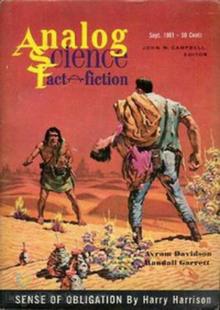 Sense of Obligation
Sense of Obligation Deathworld: The Complete Saga
Deathworld: The Complete Saga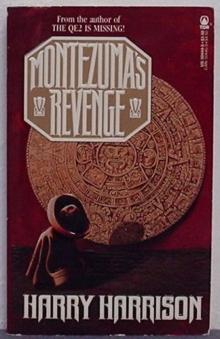 Montezuma's Revenge
Montezuma's Revenge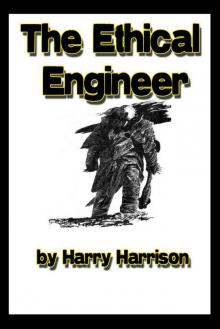 The Ethical Engineer
The Ethical Engineer The Stainless Steel Rat Returns
The Stainless Steel Rat Returns The Misplaced Battleship
The Misplaced Battleship The Stainless Steel Rat is Born
The Stainless Steel Rat is Born Planet of the Damned bb-1
Planet of the Damned bb-1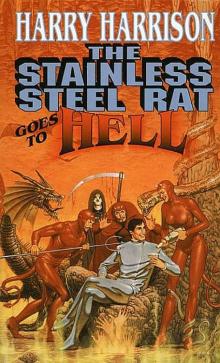 The Stainless Steel Rat Goes to Hell ssr-10
The Stainless Steel Rat Goes to Hell ssr-10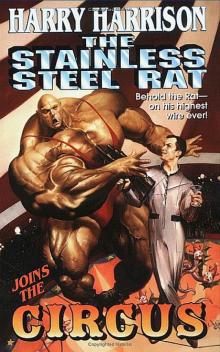 The Stainless Steel Rat Joins the Circus ssr-11
The Stainless Steel Rat Joins the Circus ssr-11 Galactic Dreams
Galactic Dreams The Harry Harrison Megapack
The Harry Harrison Megapack In Our Hands the Stars
In Our Hands the Stars On the Planet of Robot Slaves
On the Planet of Robot Slaves The Military Megapack
The Military Megapack Make Room! Make Room!
Make Room! Make Room! Wheelworld
Wheelworld Winter in Eden e-2
Winter in Eden e-2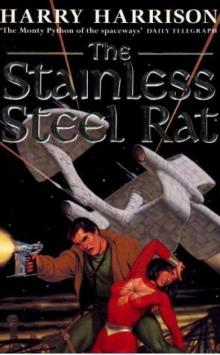 The Stainless Steel Rat
The Stainless Steel Rat The Stainless Steel Rat Goes to Hell
The Stainless Steel Rat Goes to Hell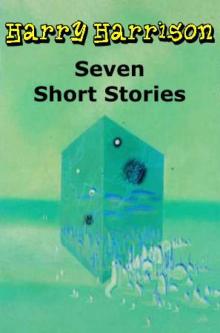 Harry Harrison Short Stoies
Harry Harrison Short Stoies Stainless Steel Rat 11: The Stainless Steel Rat Returns
Stainless Steel Rat 11: The Stainless Steel Rat Returns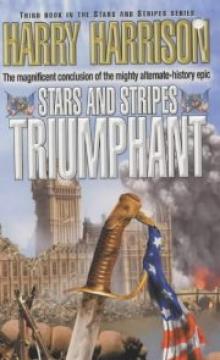 Stars and Stripes Triumphant sas-3
Stars and Stripes Triumphant sas-3 West of Eden
West of Eden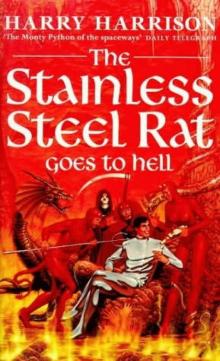 The Stainless Steel Rat Go's To Hell
The Stainless Steel Rat Go's To Hell The Stainless Steel Rat eBook Collection
The Stainless Steel Rat eBook Collection Lifeboat
Lifeboat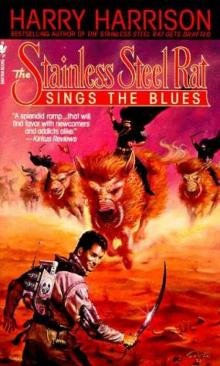 The Stainless Steel Rat Sings the Blues
The Stainless Steel Rat Sings the Blues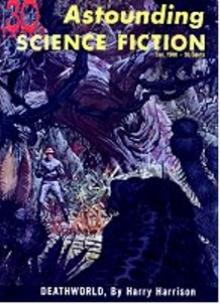 Deathworld tds-1
Deathworld tds-1 On the Planet of Zombie Vampires
On the Planet of Zombie Vampires The Daleth Effect
The Daleth Effect On The Planet Of The Hippies From Hell
On The Planet Of The Hippies From Hell The Turing Option
The Turing Option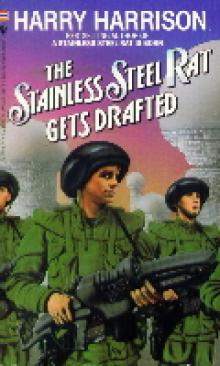 The Stainless Steel Rat Gets Drafted
The Stainless Steel Rat Gets Drafted Bill, the Galactic Hero btgh-1
Bill, the Galactic Hero btgh-1 The Stainless Steel Rat in The Missing Battleship
The Stainless Steel Rat in The Missing Battleship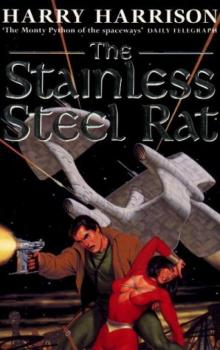 The Stainless Steel Rat ssr-1
The Stainless Steel Rat ssr-1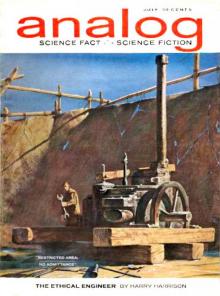 The Ethical Engineer (the deathworld series)
The Ethical Engineer (the deathworld series) The Stainless Steel Rat Saves the World ssr-3
The Stainless Steel Rat Saves the World ssr-3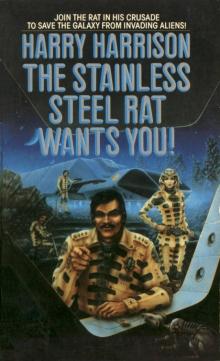 The Stainless Steel Rat Wants You
The Stainless Steel Rat Wants You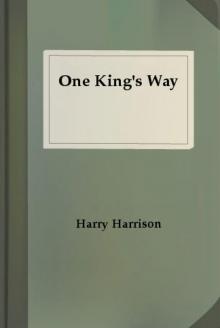 One King's Way thatc-2
One King's Way thatc-2 The Stainless Steel Rat Saves The World
The Stainless Steel Rat Saves The World Bill, the Galactic Hero
Bill, the Galactic Hero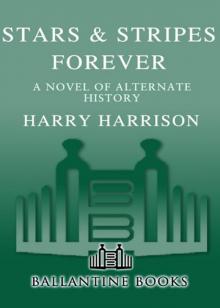 Stars & Stripes Forever
Stars & Stripes Forever Stars and Stripes In Peril sas-2
Stars and Stripes In Peril sas-2 A Stainless Steel Rat Is Born ssr-6
A Stainless Steel Rat Is Born ssr-6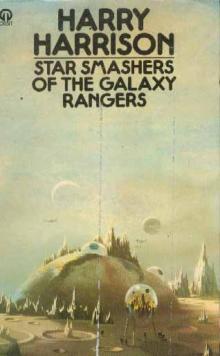 Star Smashers of the Galaxy Rangers
Star Smashers of the Galaxy Rangers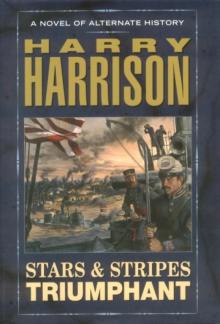 Stars & Stripes Triumphant
Stars & Stripes Triumphant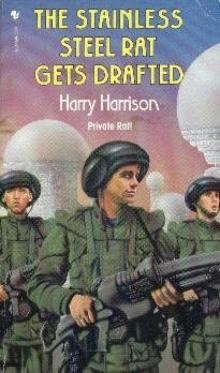 The Stainless Steel Rat Gets Drafted ssr-7
The Stainless Steel Rat Gets Drafted ssr-7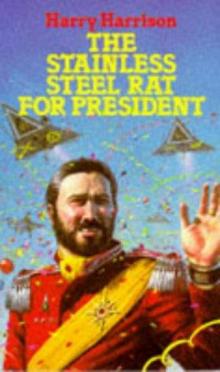 The Stainless Steel Rat for President ssr-5
The Stainless Steel Rat for President ssr-5 The Hammer & the Cross
The Hammer & the Cross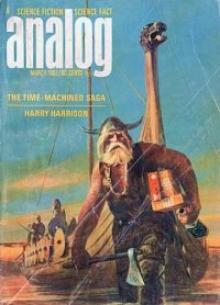 The Technicolor Time Machine
The Technicolor Time Machine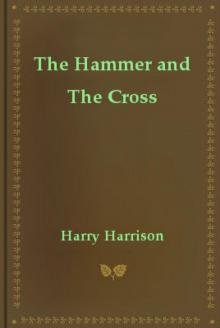 The Hammer and The Cross thatc-1
The Hammer and The Cross thatc-1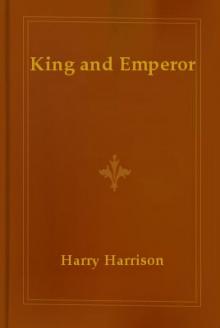 King and Emperor thatc-3
King and Emperor thatc-3 Return to Eden
Return to Eden The Stainless Steel Rat’s Revenge ssr-2
The Stainless Steel Rat’s Revenge ssr-2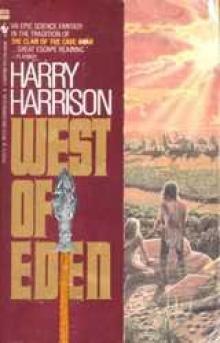 West of Eden e-1
West of Eden e-1 Return to Eden e-3
Return to Eden e-3 A Transatlantic Tunnel, Hurrah!
A Transatlantic Tunnel, Hurrah! Stars and Stripes Forever sas-1
Stars and Stripes Forever sas-1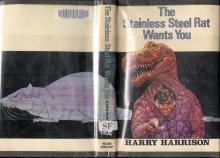 The Stainless Steel Rat Wants You ssr-4
The Stainless Steel Rat Wants You ssr-4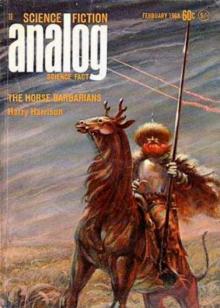 The Horse Barbarians tds-3
The Horse Barbarians tds-3 Planet of the Damned and Other Stories: A Science Fiction Anthology (Five Books in One Volume!)
Planet of the Damned and Other Stories: A Science Fiction Anthology (Five Books in One Volume!) On the Planet of Bottled Brains
On the Planet of Bottled Brains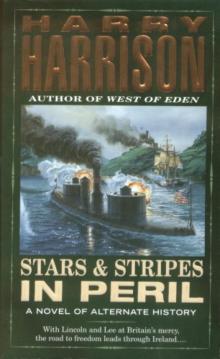 Stars And Stripes In Peril
Stars And Stripes In Peril The Stainless Steel Rat's Revenge
The Stainless Steel Rat's Revenge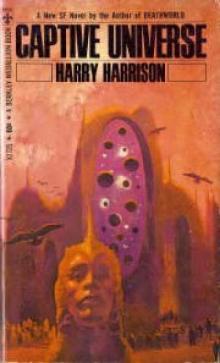 Captive Universe
Captive Universe The Stainless Steell Rat Sings the Blues ssr-8
The Stainless Steell Rat Sings the Blues ssr-8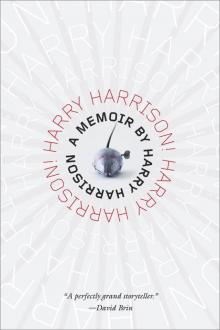 Harry Harrison! Harry Harrison!
Harry Harrison! Harry Harrison! Winter in Eden
Winter in Eden On the Planet of Tasteless Pleasures
On the Planet of Tasteless Pleasures